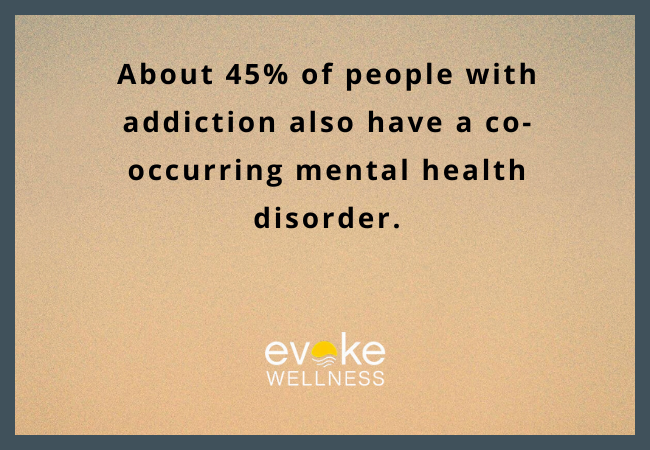For many individuals taking their first step toward sobriety, detox often feels like the end goal—something to be endured before moving on with life. And while detox is undeniably crucial, it’s far from the entire picture of recovery. In fact, detox is just the first step in a much longer, more transformative journey. Without continued treatment and support, the physical cleansing achieved in detox can quickly be undone by unaddressed emotional, psychological, and behavioral issues.
At Evoke Wellness, we guide clients through the entire recovery continuum, beginning with medical detox and extending into individualized therapy, mental health treatment, residential care, and aftercare planning. This comprehensive approach ensures that healing doesn’t stop once the body is free of substances—it evolves and deepens with time and support.
In this blog, we’ll explore why detox alone is not enough to support long-term recovery, what additional care is necessary, and how our integrated treatment programs can help individuals build a life rooted in lasting sobriety.
Understanding the Role of Detox
Detoxification is a medical process that helps rid the body of addictive substances such as alcohol, opioids, benzodiazepines, and stimulants. It is often accompanied by withdrawal symptoms—some mild and others life-threatening—that require professional medical monitoring to ensure safety and comfort.
At Evoke Wellness, we provide 24/7 care during this critical phase to ensure that clients are physically stabilized and medically supported. While detox is essential for physical health, it does not address the psychological components of addiction, such as trauma, depression, anxiety, or ingrained behavioral patterns.
Detox may clear the substance from the system, but without proper therapeutic intervention, the underlying issues that led to substance use often remain unresolved. This is why so many individuals who attempt detox without follow-up treatment find themselves relapsing—sometimes within days or weeks of discharge.
Addiction Is More Than Physical Dependence
To understand why detox alone isn’t enough, it’s important to view addiction for what it truly is: a complex and chronic disease that affects not only the body, but also the brain, emotions, and behavior. While substances create physical dependence, addiction is deeply rooted in the way people cope with life—using substances to manage stress, escape trauma, or self-medicate mental health disorders.
Without addressing the mental and emotional components of addiction, physical sobriety cannot be sustained. People relapse not because they lack willpower, but because they lack the tools and support needed to manage triggers, emotions, and daily life without substances.
Therapeutic treatment after detox gives individuals the space and resources to explore these deeper layers of addiction. Whether through individual therapy, group counseling, or psychiatric care, continuing treatment is where true transformation begins.
The Importance of Mental Health Integration
Many people who struggle with addiction also face co-occurring mental health disorders such as depression, anxiety, PTSD, or bipolar disorder. These co-occurring conditions often go undiagnosed or untreated, particularly if a person ends their recovery process after detox. Mental health issues can serve as triggers for relapse if they’re not addressed.
Evoke Wellness integrates mental health services across all levels of care, offering targeted therapy and psychiatric support for clients who need it. Our team uses evidence-based approaches to ensure that clients receive the help they need to heal emotionally and psychologically—not just physically.
This is where therapies like Cognitive-Behavioral Therapy in Massachusetts come into play. CBT teaches clients how to identify and challenge negative thought patterns, regulate emotions, and develop healthier ways of thinking and behaving—all of which are crucial to maintaining long-term recovery.
Life After Detox: What’s Next?
Detox prepares individuals to begin recovery, but what comes next is equally—if not more—important. After the physical withdrawal period ends, the real work of recovery begins.
At Evoke Wellness, we help clients transition seamlessly from detox into the next appropriate level of care, which may include:
-
Residential treatment
-
Partial hospitalization (PHP)
-
Intensive outpatient programs (IOP)
-
Mental health therapy
-
Aftercare planning and alumni support
The goal is to ensure that each client receives the structured, ongoing support needed to sustain recovery. For many, the best next step is enrolling in a Residential Treatment Program in Massachusetts, where they can continue their healing in a safe, supervised, and substance-free environment. This setting allows for immersive therapy, skill-building, and emotional support, all of which lay the foundation for long-term success.
Preventing Relapse: Why Continued Treatment Matters
Research consistently shows that individuals who only complete detox have a much higher risk of relapse compared to those who participate in extended treatment. This is because detox does not teach coping skills, relapse prevention strategies, or emotional regulation—critical tools needed for navigating life in recovery.
Without therapy and follow-up care, clients are often unprepared to face triggers, relationship challenges, or the stress of daily living without returning to substance use. Extended treatment helps reduce these risks by offering:
-
Cognitive and behavioral therapy
-
Life skills development
-
Peer support and group therapy
-
Family therapy and education
-
Structured routines and accountability
-
Holistic practices like yoga and mindfulness
When clients complete an Alcohol Detox Program in Massachusetts, for example, they are especially vulnerable to relapse due to the social and emotional nature of alcohol use. Continued care helps them build a recovery plan that includes sober supports, lifestyle changes, and relapse prevention techniques.
Building a Life Beyond Sobriety
Recovery is about much more than abstaining from substances—it’s about building a meaningful, fulfilling life. That might mean repairing relationships, discovering new passions, pursuing education or a career, or reconnecting with one’s identity and purpose.
Our programs go beyond detox to help clients envision and achieve these goals. Whether someone is seeking support for alcohol, opioids, or another substance, our team works to instill hope, purpose, and direction in every client we serve.
We also believe that connection is key to sustained recovery. Our clients leave treatment with a recovery community and an aftercare plan that includes ongoing therapy, alumni services, and connections to local support groups.
One example of our full continuum of care includes supervised medical Detox in Massachusetts, followed by residential or outpatient treatment, and continued engagement with aftercare services—all designed to support lasting change.
Why Choose Us
Evoke Wellness is more than just a detox center—we’re a full-service recovery facility committed to helping people rebuild their lives from the inside out. Here’s what sets us apart:
-
Medical Expertise and Compassionate Care: Our licensed professionals provide round-the-clock medical care and emotional support to ensure that detox is safe, comfortable, and dignified.
-
Customized Treatment Plans: Every person’s journey is unique. That’s why we tailor our treatment approach to meet the specific needs, goals, and clinical profile of each individual.
-
Mental Health Integration: As a leading Mental Health Treatment Center in Massachusetts, we offer comprehensive care for co-occurring mental health conditions through therapy, medication management, and psychiatric support.
-
Continuum of Care: From detox and inpatient treatment to outpatient care and alumni services, we guide clients through every stage of their recovery journey.
-
Holistic and Evidence-Based Therapies: We combine traditional therapies like CBT and DBT with holistic services such as meditation, yoga, nutrition counseling, and expressive therapies.
-
Support for Families: We work with families to provide education, healing, and tools that help rebuild relationships and create stronger support systems.
-
Alumni Network and Aftercare: Our recovery doesn’t end at discharge. Clients benefit from our alumni programs, sober events, and continuous check-ins to stay connected and supported.
At Evoke Wellness, we don’t just help you stop using—we help you start living.
Conclusion
Detox is the foundation—but not the entirety—of a successful recovery journey. Without continued treatment, individuals are left vulnerable to the same triggers, stressors, and mental health challenges that led to addiction in the first place.
At Evoke Wellness, we provide the comprehensive, compassionate care necessary to move beyond detox and into meaningful, long-term recovery. Our programs combine medical treatment, therapeutic intervention, mental health support, and life skills training to equip clients with the tools they need to succeed—not just in treatment, but in life.
If you or someone you love is ready to take the next step after detox, we’re here to help. Call us today at 866.931.6429 to speak with a compassionate admissions specialist. Let’s take the journey together—from detox to lifelong recovery.
FAQ on Detox and Long-Term Recovery
What is the main goal of detox?
The goal of detox is to safely clear substances from your body while managing withdrawal symptoms under medical supervision. Detox helps stabilize your health but does not address the underlying causes of addiction, such as mental health issues or behavioral patterns.
Can detox alone keep me sober long-term?
Detox alone is not enough for long-term sobriety. While it addresses physical dependence, it does not provide the coping skills, therapy, or emotional healing necessary to prevent relapse. Without continued treatment, relapse rates after detox can be as high as 60–80%.
What happens after detox?
After detox, continuing treatment is critical. This can include inpatient rehab, partial hospitalization programs (PHP), intensive outpatient programs (IOP), counseling, therapy, and aftercare support. These programs help you build the tools needed for lasting recovery.
How soon should I enter treatment after detox?
Ideally, you should transition into the next level of care immediately after detox to maintain momentum in your recovery and reduce the risk of relapse.





